PVA – the live dance band packing out venues off the back of half a song of released music
Who needs to release an album anyway?
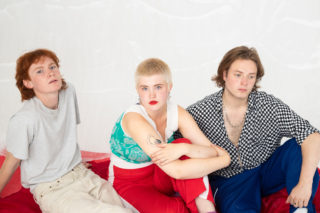
Who needs to release an album anyway?
Today is Josh Baxter’s birthday, but his bandmate Ella Harris seems more excited about it than he does. “Do you want your present now?” she asks, rummaging around in her bag. PVA’s lead singer glances at the gift and then glances at me as I fiddle with the recorder. He thinks better of it. “Maybe we should wait until afterwards?”
With drops of rain falling, we duck inside a small South London bar, and drummer Louis Satchell heads over to buy Baxter his first Birthday beer. The Waiting Room, across from Deptford train station, is one of those kinds of coffee shops turned bars that doubles as a workspace during the day and a place to drink cocktails at night. It’s an area that means a lot to the members of PVA. It was just down the road from here at the Bunker where the band played a couple of legendary early shows. “We just suit the Bunker,” beams Satchell as he returns with an arm full of beers. “We headlined two nights there, and they were like these really sweaty, intense experiences. They were amazing.”
PVA’s reputation as a live band is undoubtedly one of the most significant factors behind the band’s rapid rise. However, having a continually evolving sound that’s as captivating as it is hard to pin down helps too. Rooted in dance music, their music mutates and warps around an array of genres, from ’80s synth-pop, Balearic house and nosebleed techno to brooding post-punk and industrial noise. The band are a refreshingly unique listen – both brutal and dripping in underground cool, but accessible and, most importantly, totally danceable.
Therefore, it makes complete sense when Harris tells me that she met Baxter at a party. “I just bumped into him at a friend’s house party about two years ago. I kind of knew him already, as Josh used to play in a band with another mate of mine, and we just ended up chatting.”
“I have to say it was pretty good timing. I’d just made some demos for what eventually turned into PVA,” says Baxter. “I was telling Ella that I was thinking of playing them live and she was like, ‘well, I’ve got this event coming up in about a month – shall we just play them there?’ We were like, ‘sick, let’s practice and make sure it’s done by then’.”
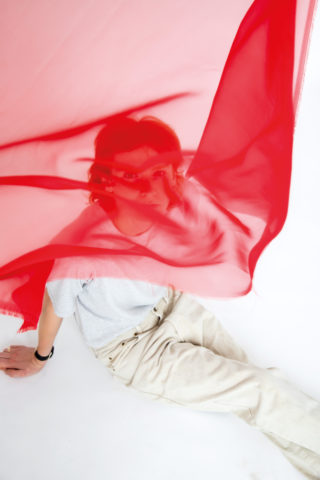
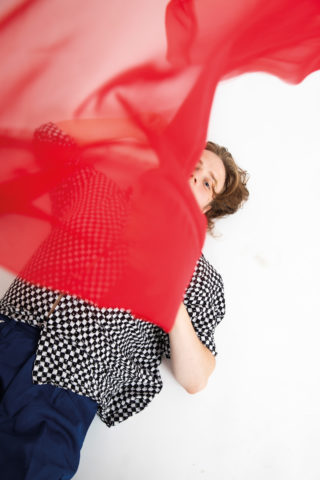
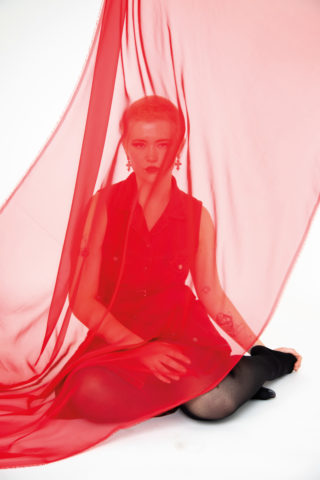
With songs and a gig lined up, the only thing the pair needed now was a name. “I cannot tell you how much trouble we had with that,” recalls Harris with a knowing sigh. “We didn’t have one until about three days before the show, and I couldn’t even announce that we were playing. We bickered for ages, I think we had about three weeks’ worth of rehearsals and about four weeks’ worth of fighting about the name. We tried out random name generators, everything. I mean, at one point we had Josh and the Sex Instructors, which was so crass.”
“No! It was so good,” Baxter fires back, feigning outrage. “We also had Joshua’s Midnight Evangelists. You liked that one at the time.”
“Yeah. I don’t know why though. Looking back now I’m so glad we didn’t go for that one.”
Eventually landing on the name PVA Presents before cutting that down further to just PVA, the band has embarked on a whirlwind18 month’s of shows. Adding Satchell on drums in March this year, in time for a support show with Black Midi, the three-piece have built an audience on the back of just playing gigs. From slots at local haunts such as Brixton’s Windmill, they have gone onto festival appearances at Green Man and Test Pressing, and club shows in Manchester, winning more and more fans as they go. This has resulted in PVA being a slightly weird position at the time of writing – they’re perhaps the first band I’ve come across who can sell out pubs off the back of only half a song of released music.
When I put this to the band, Harris just shrugs. “For us, the live show definitely comes first. We’re not trying to be aloof or anything like that, we just want to make sure that the first release really encompasses everything we’re about as a band. Our live show is all about harnessing the energy of an audience – it’s just finding a way that we can translate that into a recording.”
“I think it’s also helping us in a way,” adds Baxter. “Not having all that much music online, means people have to come and see us to get what we’re all about. I’d rather people come to the live show than just listen to one song on Spotify. Besides, the live show takes just as much of our energy as recording. We really care about getting that right.”
Just like their sound, PVA aren’t about to take a straightforward approach to making music. Baxter and Harris’ theories on how a band should operate in 2019 look towards the grind of networking over album reviews. The concept is elegant in its simplicity: build your rep by putting on live shows, impress the hell out of the audience and then rely on word of mouth to bring more people. When I ask if the trio’s grassroots success means that we might be waiting a while for a PVA album Baxter is happy to take things further. “Y’know what, it’s almost like the recordings and the albums don’t really matter as much as they used to,” he tells me. “They are more to advertise your live show, which is a massive flip from 50 years ago when you would have to tour to promote your album. I kind of like that. It’s created live music to be this experiential thing. ”
A philosophy that puts experience above all other things is the key to understanding PVA’s whole take on music. Not only does it inform the way the band’s act, but you can also find it in the band’s live performances. Driven by motoring arpeggio synth, mechanical basslines and auto-tuned vocals, their sets are a carefully constructed weave of different moods and tempos. The band’s sets are also nothing if not inventive. Often starting with bleak industrial noise, 45 minutes later you’re usually spat out with a slice of Daft-Punk style pop. PVA want your attention and work hard to make sure that they have it.
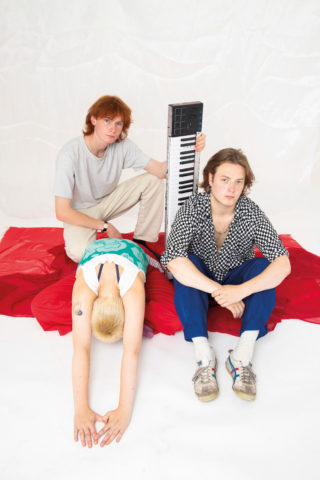
“One of the things that have always attracted me to dance music is that it has something that is really immersive about it, which other types of music don’t really have,” explains Harris when I ask her about the work that goes into the band’s sets. “Yeah, maybe you could go to a punk show and let out your aggression and find catharsis, but dance music is a lot more euphoric. I think it’s just about exploring the different ways you can make music that is dance orientated while bringing in the other influences that we have. We’re still working on it, and we’re still refining it, but it’s really exciting to be able to try out new things.
“I think it’s all about creating these special, unique moments. I mean, every gig we play has its own energy. I love the way we can take an audience on a journey from a kind of techno-hell landscape to this really euphoric place. Even though all the songs are different and don’t really conform to one style or another, I think the cohesiveness comes from having this unifying driving force behind them. It shouldn’t really work, but somehow it really does.”
After a summer spent tweaking and perfecting their set, it feels like PVA are about to enter a period of transition over the Autumn. Partly this is down to circumstances – Harris has recently moved to Manchester, leaving the band split between Croydon, Holloway and the north of England – but I also get the impression that the group are itching to start tinkering.
“It has changed the dynamics a little bit,” admits Baxter when I ask him about his bandmate’s move. “It’s definitely made it a bit more difficult to practice and write, but we’re finding a way to work around it.”
“Maybe it’s a good thing when you think about it,” offers Harris. “Maybe it’s meant that we haven’t been able to become complacent. I mean, we want to create an even more impressive live set for 2020, and this situation kind of forces us to have some space to be able to look back on the set so far and work with fresh ideas. It might be a really good way of working, or it might be a really terrible way of working – only time will tell, I suppose.”